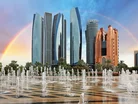Abu Dhabi first in region to join City Biodiversity Index

Abu Dhabi, the capital of the United Arab Emirates, has joined the list of 39 global cities on the City Biodiversity Index. The self-assessed index, which is also known as the Singapore Cities Biodiversity Index, is intended to help urban population centres achieve sustainable development.
Surrounded by rolling desert dunes, Abu Dhabi may not be the first place you think of when considering biodiversity, but then the same could be said of other cities in the list, such as Los Angeles, Hyderabad, and London.
However, on closer inspection, the emirate has a diverse landscape, featuring those unspoilt deserts, mangroves, mountains, and farmland.
The Environment Agency – Abu Dhabi (EAD) completed the survey as part of efforts to measure its success in preserving biodiversity while also providing a thriving metropolis.
The initiative was undertaken with the cooperation of the Department of Municipalities and Transport, the Department of Education and Knowledge in Abu Dhabi, the Statistics Center Abu Dhabi, Al Ain Zoo, and other governmental and private agencies.
Abu Dhabi ranks highly in list of global cities
“Abu Dhabi city has joined a list of 39 cities around the world that have applied the City Index of Biodiversity – making it the first in the Arab Gulf region and the Middle East,” said Dr Shaikha Salem Al Dhaheri, Secretary-General of EAD.
“Efforts made by EAD to involve the community in its endeavours to protect biological diversity contributed to the evaluation score obtained by the Agency. The Agency provides an opportunity to engage community members in a meaningful way in environmental issues.”
Ahmed Al Hashemi, Executive Director of the Terrestrial and Marine Biodiversity Sector, added that Abu Dhabi scored highly – with 86 out of 100) – compared to other cities on the index, including Brussels (Belgium), Edmonton (Canada), Nagoya (Japan), Auckland (New Zealand), and Singapore.
The City Biodiversity Index was developed by the National Parks Board of Singapore (NParks) in collaboration with the United Nations Environment Programme (UNEP) and the Convention on Biological Diversity (CBD). It was launched in 2008.
The Index covers a broad range of indicators, including:
- Native biodiversity – the abundance and diversity of native species.
- Ecosystem services – the benefits that biodiversity provides to people, such as clean air and water, pollination, and flood control.
- Governance and management of biodiversity – policies, plans, and initiatives for biodiversity conservation.
The Index is seen as a valuable tool for cities that are committed to protecting biodiversity, helping them to benchmark and identify their strengths and weaknesses.
Dubai developer puts forward plans for floating reef resorts
North of Abu Dhabi, in the tourism hotspot of Dubai, plans have also been announced for the world’s largest ecotourism project – Dubai Reefs.
The ambitious plans would see an artificial reef of some 200 square kilometres built parallel to famous coastal developments including The Palm Jumeirah, Dubai Marina, Burj Al Arab, and JBR.
Visitors would stay in floating eco-lodges powered by renewable energy, and be able to take part in marine restoration experiences.
The reef would require an estimated 100 million mangrove trees, creating a habitat for more than a billion corals.
Similar coral reef projects are also underway in Saudi Arabia’s Red Sea Global development.




